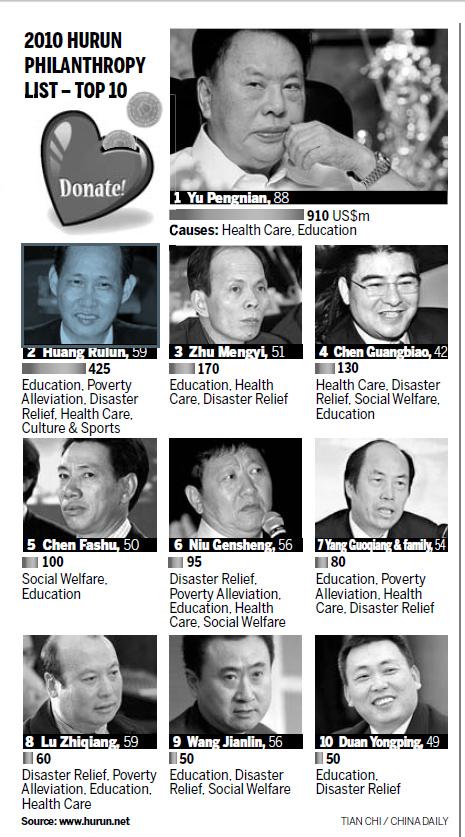SHANGHAI -- Donations from China's wealthiest are on the rise, with the country's top 100 philanthropists giving away 22.9 billion yuan ($3.3 billion) to charity since 2005.
The top 100 philanthropists donated an average of 229 million yuan each over the last five years, or six percent of their wealth, up from four percent last year, said the 2010 Hurun Philanthropy List released on Thursday.
The 50 most generous last year donated 8.2 billion yuan, eight times the average of the first philanthropy list in 2004, said the report.
Large donations have also been on the rise with three philanthropists donating more than $100 million last year and 13 donated more than $10 million.
Education, disaster relief and health care are the main beneficiaries. China's first generation of entrepreneurs has been building schools in rural areas and donating to disaster relief, most recently to the Qinghai earthquake, the report said.
The list, in its seventh year, ranks the top 100 most generous Chinese individuals measured by the value of their donations over the past five years.

Yu Pengnian, an 88-year-old hotel and real estate entrepreneur in Shenzhen, was ranked the most generous donor for the fifth consecutive year.
He became China's first billion-dollar philanthropist by announcing on Thursday the donation of his remaining fortune - $470 million in cash and property - to the Yu Pengnian Foundation, bringing the value of the HK-registered fund to $1.2 billion. The fund donates to health, education and disaster relief.
Huang Rulun, chairman of the Jinyuan Hotel Group, came in second by giving away $425 million since 2005. Zhu Mengyi, also known as Chu Mang Yee, chairman of property developer Hopson Development Holdings Ltd, ranked third with donations reaching $170 million.
"China's top wealth creators are now making significant donations," said Rupert Hoogewerf, head of research at Hurun Report. "While there remains public skepticism of some of their motives behind many donations, it is now no longer possible to ignore Chinese philanthropy, which has landed on the world map."
He said Chinese philanthropists' average donation of six percent of their wealth is "a pretty high number even compared with that of Europe and the US."
He also said the Sichuan earthquake has been a catalyst for Chinese philanthropy, and that together with the recent Yushu tremor in Qinghai it has brought social responsibility and charity to the fore.
During a national broadcast on China Central Television on April 20, three entrepreneurs, Cao Dewang, Lu Zhiqiang and Wang Jianling, donated more than $10 million to the Yushu earthquake. These donations were not included in the 2010 Hurun Philanthropy List, which had an April 9 cut-off.
Chinese entrepreneurs now consider charitable donations to be the third most important way to demonstrate corporate social responsibility, behind payment of taxes and environmental protection, according to a survey released by the Hurun Report in January this year.
The survey also showed two thirds of China's entrepreneurs are willing to donate through charitable foundations, demonstrating a significant growth in the credibility of public charities in China, led by the Chinese Red Cross and Project Hope.
Fan Lizhu, a sociologist from Shanghai-based Fudan University, said lists such as the Hurun Report have created a favorable social environment for the development of the country's philanthropy sector.
"By making names of those philanthropists known to the public, it could encourage more entrepreneurs and even the common folk to follow suit. Through that we'll come to know what wealth is for," she said.
The Hurun Report also found more of China's philanthropists are born in Guangdong than any other parts of China, with 18 in total. Zhejiang and Fujian are second and third, with 15 and 13 respectively.





